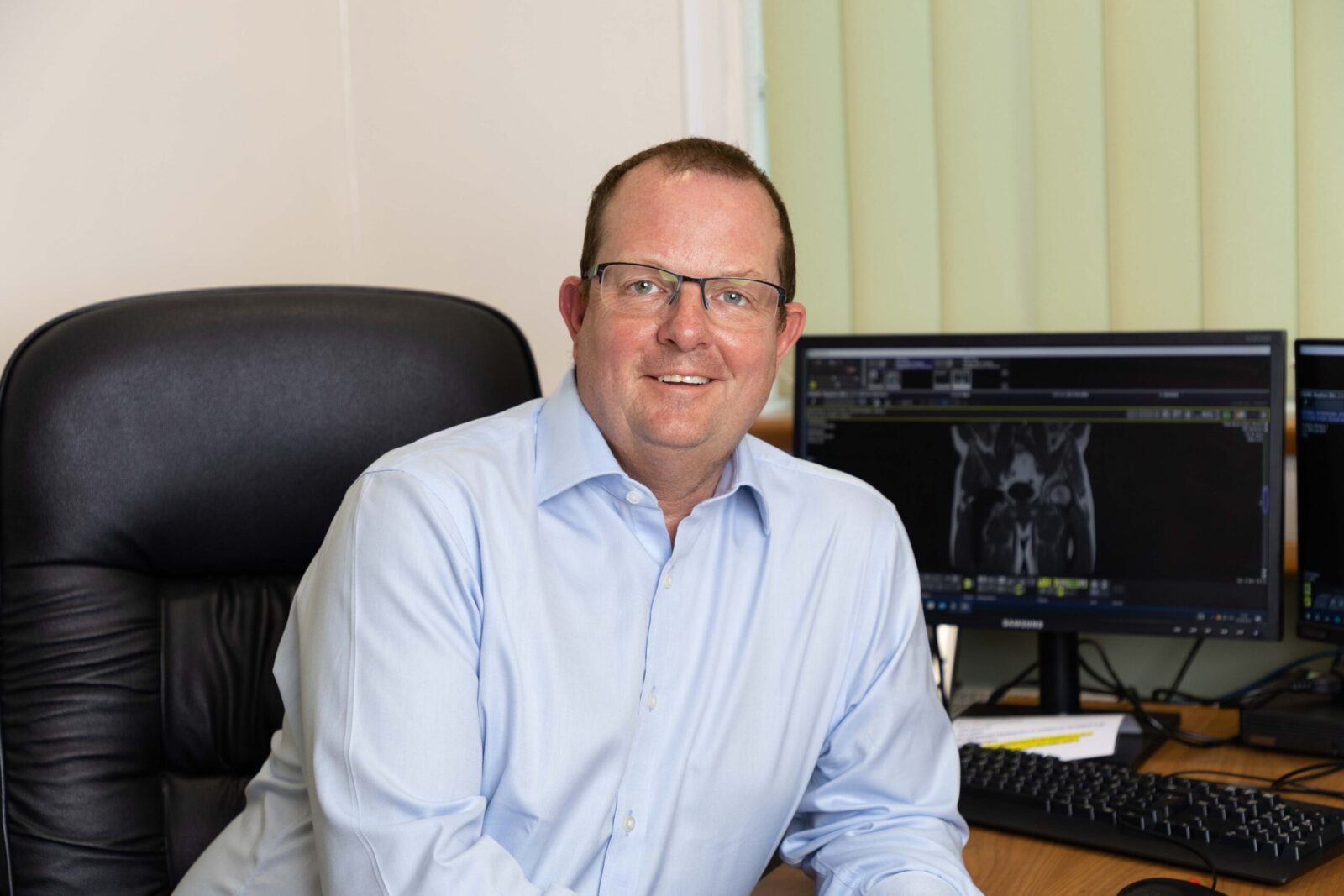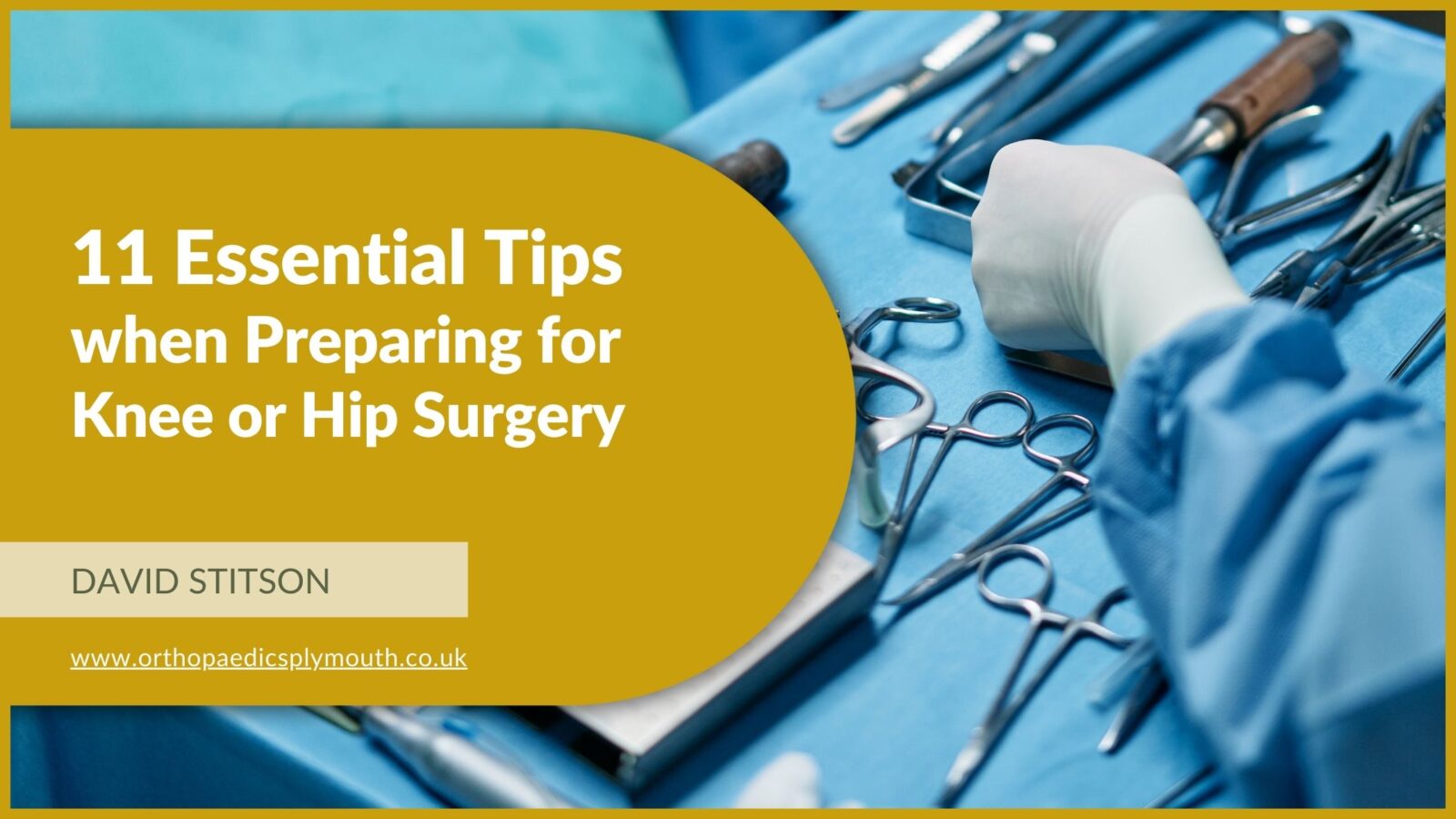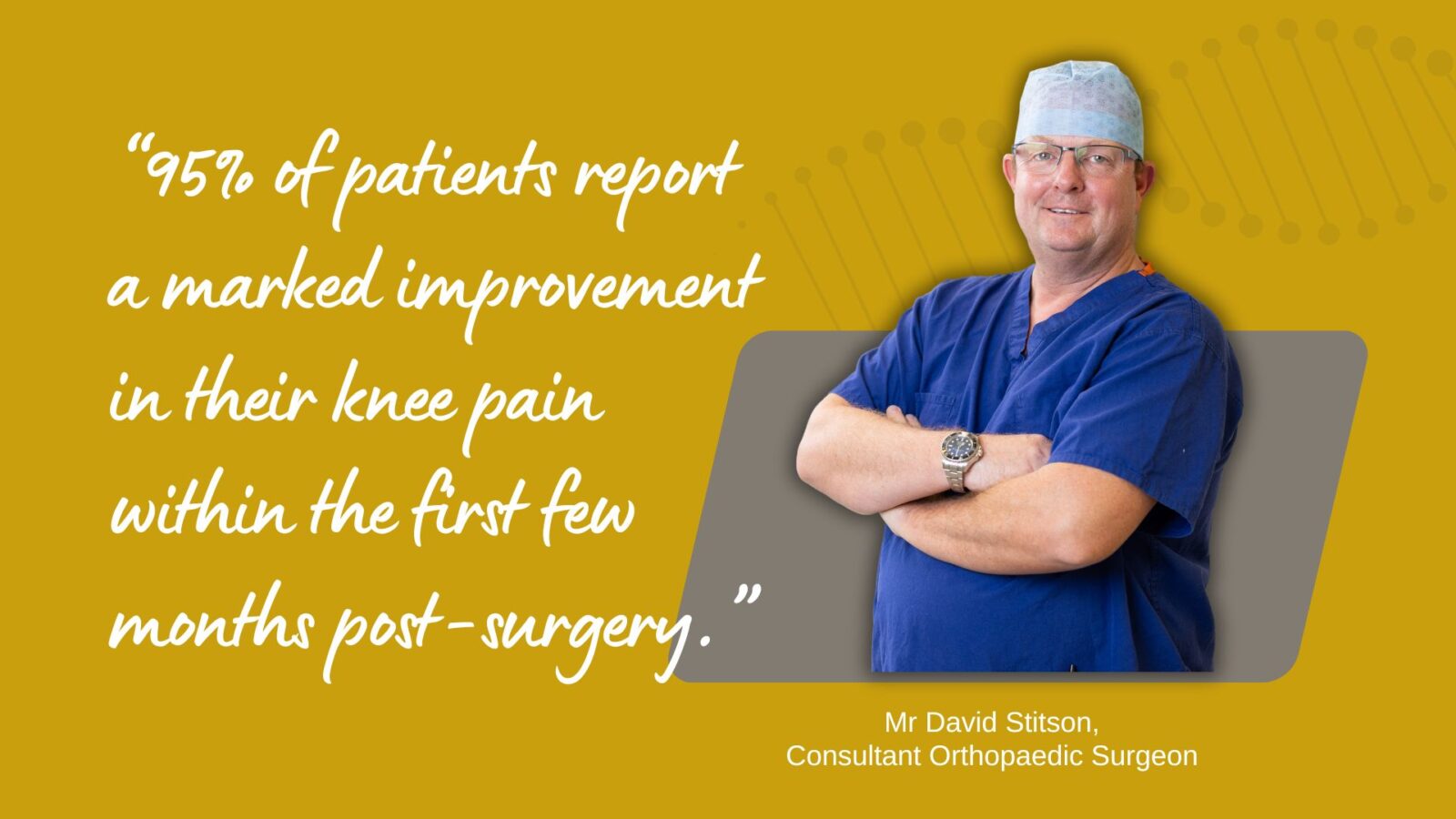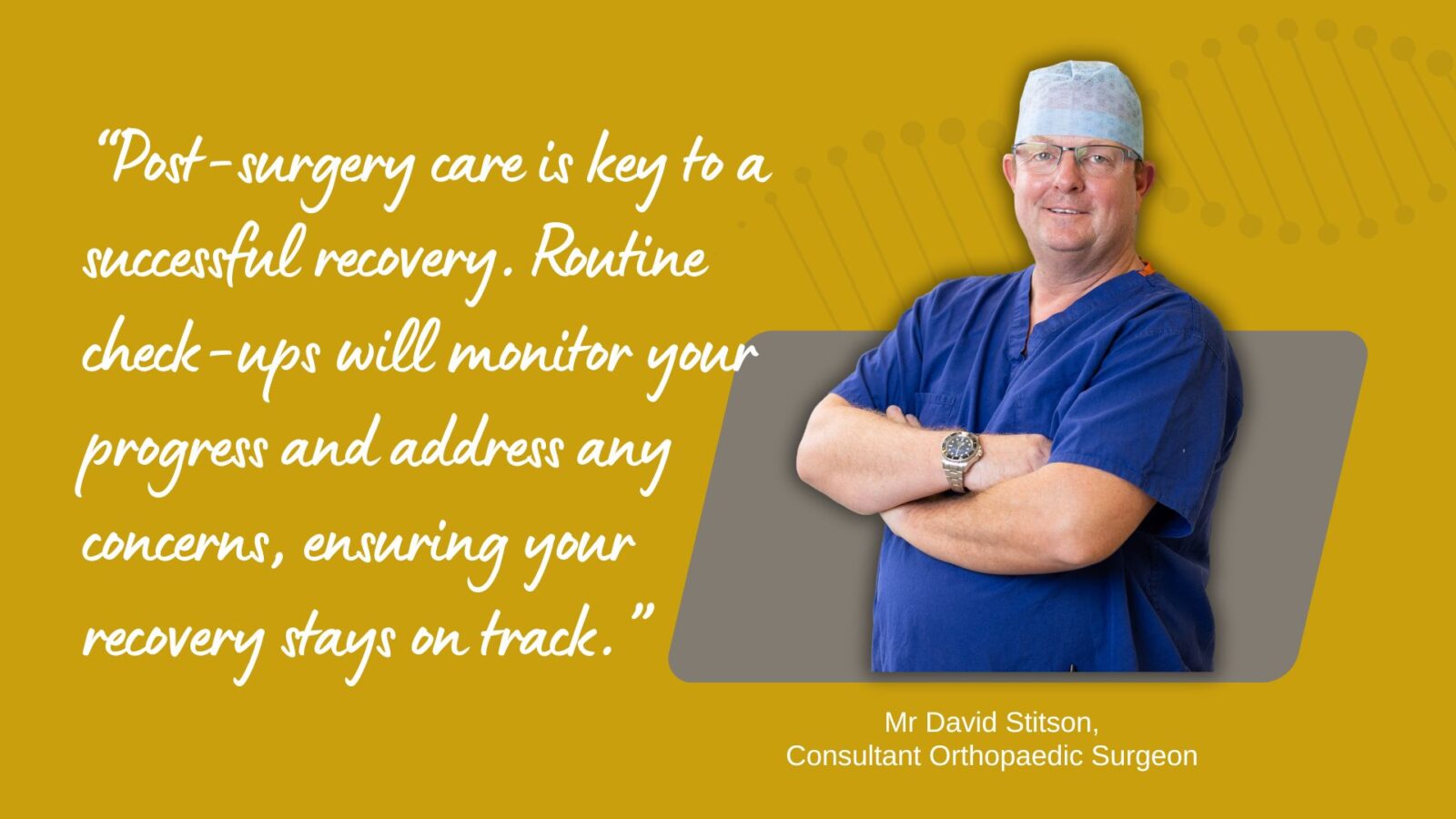Facing the prospect of knee or hip surgery can be daunting, but with the right preparation, you can set yourself up for a smoother experience and a quicker recovery.
Whether you’re dealing with osteoarthritis, an injury or another condition requiring surgery, these comprehensive tips will guide you in preparing both mentally and physically for your procedure. Under the expert care of Mr David Stitson, Consultant Orthopaedic Surgeon in Plymouth, you can be confident in receiving bespoke orthopaedic treatment to relieve pain and regain mobility.
Contents
Toggle1. Understand Your Procedure
Knowledge is power when it comes to surgery. Take the time to have a detailed discussion with David Stitson about the specifics of your knee or hip surgery. Understanding what the procedure involves, appreciating the benefits and the understanding the risks will help alleviate anxiety and empower you in your healthcare journey.
2. Organise Your Health Records
Before your surgery day arrives, ensure all pertinent health records are up-to-date and shared with Mr Stitson and his team. This includes any previous operations, current medications and details of any other health conditions. Having a comprehensive health history will enable your surgeon to make the best possible decisions for your care.
3. Review Your Medication
Inform Mr Stitson and his team about any medications or supplements you are currently taking. Some medications, especially blood thinners, may need to be paused prior to surgery to minimise risks. Trust your healthcare provider to guide any necessary adjustments to your medication regimen.
4. Get Your Home Ready
Post-surgery recovery may require that you limit your mobility for a while and so preparing your home in advance is advisable. Consider moving frequently used items to waist level for easy access, removing potential trip hazards like rugs and setting up a comfortable recovery area complete with pillows, a telephone and entertainment to keep you comfortable as you heal.
5. Build a Support Network
Having a strong support network is invaluable during the recovery period. Arrange for friends or family members to assist with daily tasks such as grocery shopping, cooking and cleaning. Knowing you have people to rely on allows you to focus on your recovery without added stress.
6. Pre-habilitation Knee & Hip Exercises
Engaging in a tailored exercise program, or “pre-habilitation,” before your knee or hip surgery can significantly boost your recovery. Work with a physio (recommended by Mr Stitson) to develop exercises that will strengthen the muscles around the affected joint, improve flexibility and optimise your physical condition before the surgery.
7. Plan Your Post-Surgery Transport
Ensure you have transportation arranged for the day of your surgery. More often than not, patients are advised not to drive post-surgery. A friend, family member or hired service should transport you safely home, allowing you to recover without any unnecessary strain.
8. Prepare a Post-Surgery Diet Plan
Eating a healthy diet rich in protein, vitamins and minerals supports your body’s healing process. Before your surgery, plan meals that will be easy to prepare and digest in your post-operative days. Incorporating foods known for their anti-inflammatory properties, like fish, leafy greens, and berries, can aid recovery.9. Pre-Arrange Follow-Up Appointments
Post-surgery care is key to a successful recovery. Coordinate with Mr Stitson’s secretary to schedule follow-up visits well in advance. Routine check-ups will monitor your progress and address any concerns, ensuring your recovery stays on track.10. Familiarise Yourself with Knee & Hip Physiotherapy
Physiotherapy often forms a large part of post-operative rehabilitation. Familiarise yourself with the types of exercises and therapy you will likely undertake following your surgery. Being pro-active will make you more comfortable when attending your physio sessions and following through with your at-home exercise programme.11. Mental Preparation and Stress Management
Surgery can be stressful, but taking time to manage stress can improve your overall surgical outcome. Methods such as meditation, yoga, or simple deep breathing exercises can calm pre-surgery nerves. Mr Stitson and his team are available to answer any questions, provide reassurance and support you through this process.It is essential to discuss all your options with Mr Stitson, who can guide you through the treatment process and advise on how you can achieve the best possible outcome.
Embarking on your journey to improved joint health under the care of Mr David Stitson, Consultant Orthopaedic Surgeon in Plymouth, means you have access to unrivalled and prompt treatment. Specialising in knee and hip surgery, Mr Stitson provides bespoke solutions aiming to alleviate pain and restore your ability to move freely. By preparing attentively for your surgery, you enhance your potential for a positive outcome, enabling you to return to the activities you enjoy most and with renewed confidence.
About Hip Surgery
Hip replacement surgery replaces the worn-out, painful and stiff hip joint with a new prosthetic joint. This procedure is normally performed under spinal anaesthesia and is commonly followed by a night or two in the hospital. Day-case hip replacement surgery may be an appropriate option for you.
About Knee Surgery
Knee replacement surgery replaces the worn out, painful and stiff knee joint with a new prosthetic joint. This procedure which may be a partial or a total replacement is normally performed under spinal anaesthesia and is usually followed by a night or two in the hospital. Day-case knee replacement surgery may be an appropriate option for you.

About Mr Stitson
David Stitson is a Plymouth-based Consultant Trauma and Orthopaedic Surgeon. Trained both in the UK and internationally, he has worked in medicine for more than 20 years for the NHS, for the Royal Air Force and in private practice. Mr Stitson operates privately at the Nuffield Health Hospital, Plymouth.

The Nuffield Plymouth CQC Rating
The Nuffield Hospital has a history that spans over half a century and has built a reputation for high standards of care, professionalism and expertise in delivering health services. They aim for continuous quality improvement in everything they do.
Active Quality and Governance programmes are in place at the Nuffield Hospital Plymouth. As part of this, the hospital is inspected by independent healthcare regulators to ensure it meets the fundamental standards of quality and safety as determined by the regulating body (CQC).
In the most recent inspection, Plymouth Nuffield Hospital was rated as ‘Good’ overall, however, the surgical element of the inspection was rated as ‘Outstanding’. The hospital was referred to as:
“Outstanding in effective and caring, and
Good in safe, responsive and well-led.”






